VentureBeat Beats up on the East Coast
The most astonishing thing about VentureBeat’s analysis is its claim that East Coast start-ups are more self-absorbed! (They use FL-based PayPerPost and their video blog as an evidence that “the most ridiculous examples of self-absorbtion [sic] do not necessarily hail from Silicon Valley, as some might assume.”)
So, my question to the NYC start-up community is this: Really folks? Are we really more self-absorbed as a start-up community? Or is VentureBeat just looking for ways to “Beat up” the East Coast by inappropriately “Beating __” the West Coast?
Are self-absorption levels even worth talking about?
As you think about it, check out the cake West Coast-based Meebo made for a company party.

Proto 1.5 free for individual use
Proto Software has released v1.5 of their custom applications builder, which includes a free, full-featured version of the software for personal (non-commercial) use. You can check out a screencast to see what’s new, and if you want to give it a whirl there’s over 20 detailed guides to get you on your feet.
The free version seems like a good move to increase Proto’s userbase as more and more students and hackers become widget and webapp hobbyists in their free time. Congrats to Jeb and Byron on the release!
Jonah Keegan is an entrepreneur with a business, a blog and a few other things.
nextNY Spotlight on David S. Rose, Founder of the New York Angels

David was kind enough to answer a few questions by e-mail for us. He is already a veteran of nextNY events, participating in our Community Conversation on “Startup 101” and PitchCamp. Yet, still, he probably remains one of the most under the radar angel investors out there. We’re glad that he has given our members several opportunities to get to know him better.
1) I’ve heard the 10 minute version of a brief 2 minute description of yourself and your background in person… but here I can hold you to a word count. Think you can tell us who you are in 100 words or less?
A serial entrepreneur turned serial angel investor, David S. Rose is passionately convinced that entrepreneurship is the core of a successful society. Having started half a dozen businesses and making it to the Inc. 500, he founded New York Angels and has been described by Crain’s as the “father of angel investing in New York”. His current portfolio includes over three dozen cool startups of which he’s Chairman of three, and as an entrepreneur himself he’s CEO of Angelsoft, which currently back-ends over 90 angel groups on three continents. He also runs the #1 Google-ranked web site on letterpress printing.
2) If there were two or three key problems that you would like to see every single startup out there that thought they had a solution for, what would those problems be?
Effective spam filtering, usable universal remote control for consumer electronics, web-based personal assistant service
3) If you had to invest every penny that you had in a company based on their answers to just three questions, what questions would you ask?
Would the last three people you fired work for you again?
What do you see as the role of an angel investor in your company?
Are you prepared to invest every penny that YOU have in your own company?
4) What are the best and worst things about trying to build a startup in New York?
Best: unbelievable talent pool, lots of synergistic companies, great energy and dynamism
Worst: high cost of talent, easy to get lost in the shuffle, not as many VCs as the West Coast
5) Who are the three wisest people in the NYC technology scene that you know?
Really, really tough call! There are many wise ones, but I’ll give you six, in no particular order:
Howard Morgan
Scott Kurnit
Esther Dyson
Stuart Ellman
Jon Whelan
Henry Kressel
_________________________
Charlie O’Donnell is the Director of Consumer Products at Oddcast, a New York City venture backed startup whose avatar platform is used for interactive advertising and personal expression. He was formerly an Analyst at Union Square Ventures.
Contact Charlie at charlie.odonnell@gmail.com or view more articles at
www.thisisgoingtobebig.com
Holiday Startups at the December 2006 NY Tech Meetup
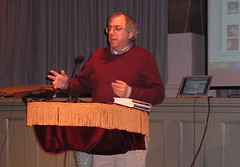 Steven Levy kicked things off with some reminiscences from his 2001 book “Hackers: Heroes of the Computer Revolution”. The book traces the PC revolution to its origins in the model railroad club at MIT, and he also touched on the Homebrew Computer Club, portraying it as a direct inspiration for events like the NY Tech Meetup, where geeks would show off their new toys and network. In an amusing anecdote, he told of the first program homebrew wrote for the Altair, enabling the computer to play the song Daisy by manipulating feedback through a radio (Altair had no internal sound). He then discussed his new book “The Perfect Thing” which covers the design and launch of the iPod along with its subsequent success. In keeping with one of the iPod’s signature features, the book comes in four versions with identical chapters but, apart from Chapter 1, the other chapters are all shuffled in different orders across the four versions.
Steven Levy kicked things off with some reminiscences from his 2001 book “Hackers: Heroes of the Computer Revolution”. The book traces the PC revolution to its origins in the model railroad club at MIT, and he also touched on the Homebrew Computer Club, portraying it as a direct inspiration for events like the NY Tech Meetup, where geeks would show off their new toys and network. In an amusing anecdote, he told of the first program homebrew wrote for the Altair, enabling the computer to play the song Daisy by manipulating feedback through a radio (Altair had no internal sound). He then discussed his new book “The Perfect Thing” which covers the design and launch of the iPod along with its subsequent success. In keeping with one of the iPod’s signature features, the book comes in four versions with identical chapters but, apart from Chapter 1, the other chapters are all shuffled in different orders across the four versions.
Steven was asked about the Zune in the Q&A and commented on the crippled wifi that shares songs but only gives “3 days or 3 plays” and said the Zune should have launched with the ability to detect playlists over wifi. He thinks it will be a contender eventually but that “right now the Zune is a non-starter.” As for the iPhone, he thinks it’s for real and believes Apple will rethink the phone in the same way the iPod rethought the MP3 player.
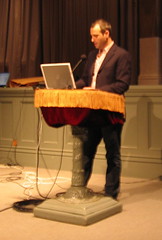 Next up was Steve Spurgat, founder of Urbis, a feedback, social-networking and freelance employment community for content creators. Writers is the only launched category to date, but Steve said Video and Audio would be coming soon. Urbis lets you post content, define who can review your content, get feedback, and set goals for your content (ex. “make children laugh”). He claimed 12,000 registered users with a monthly activity rate of 13%, 2 published writers and an imminent deal with Harper Collins to offer concrete publishing opportunities to Urbis members.
Next up was Steve Spurgat, founder of Urbis, a feedback, social-networking and freelance employment community for content creators. Writers is the only launched category to date, but Steve said Video and Audio would be coming soon. Urbis lets you post content, define who can review your content, get feedback, and set goals for your content (ex. “make children laugh”). He claimed 12,000 registered users with a monthly activity rate of 13%, 2 published writers and an imminent deal with Harper Collins to offer concrete publishing opportunities to Urbis members.
Steve was asked how he differentiates urbis from trigger street. He said the screenplay ranking site, founded by Kevin Spacey, is more of a pass/fail environment, where as urbis offers many more metrics for evaluating content and in urbis “the reviewers are also being reviewed,” allowing artists to evaluate the quality of their feedback as well. He was also asked if urbis would be used to test advertising copy against target demos, and he replied that ad agencies were “expressing interest” in the site.
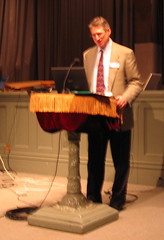 Scott Kolber from Linkstorm presented his onsite drop-down/drill-down technology for deep linking related content from publishers or in online advertising. The technology was developed by TCP/IP inventor Robert Kahn. Kolber highlighted Linkstorm’s ability to “control links remotely from a central point, without specific knowledge of where the links are deployed.” He claimed the technology generates increased direct response rates from advertising with “unfurling [rolling over the ad to initiate the drop-down list] rates as high as 23% and CTRs on unfurled ads as high as 40%.”
Scott Kolber from Linkstorm presented his onsite drop-down/drill-down technology for deep linking related content from publishers or in online advertising. The technology was developed by TCP/IP inventor Robert Kahn. Kolber highlighted Linkstorm’s ability to “control links remotely from a central point, without specific knowledge of where the links are deployed.” He claimed the technology generates increased direct response rates from advertising with “unfurling [rolling over the ad to initiate the drop-down list] rates as high as 23% and CTRs on unfurled ads as high as 40%.”
Scott was asked why their technology could not just be replicated by the publisher on-page using dynamic HTML, and replied that the centralised control for deployment on a large publisher’s site or in a distributed advertising campaign was the value added by linkstorm.
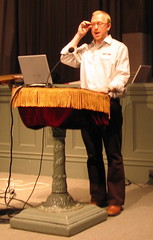 Cogmap is a wiki for company org charts, a “B2B UGC play.” The founder, Brent Halliburton, is out to disintermediate B2B direct mailing, which he pegged as a $2 Billion per year industry.
Cogmap is a wiki for company org charts, a “B2B UGC play.” The founder, Brent Halliburton, is out to disintermediate B2B direct mailing, which he pegged as a $2 Billion per year industry.
When asked what contributors ultimately get out of building this tool, Brent replied “I don’t know.” But he said the site will hopefully provide you a large return for a relatively small amount of effort on the part of any individual user. An audience member suggested charging sales people a fee to swap leads with other sales people as one way in which the site might monetize its content.
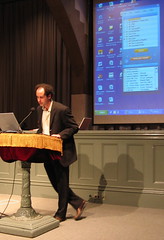 David Fishman presented uPlayMe, a P2P client that matches your music playlists with other users on the system to generate new song recommendations and do the virtual friend thing with like content consumers. The current version works only for music but future versions will include video, gaming and ebooks. David also said that a deal with an internet dating site to use their media matching technology was in it’s “final throes.”
David Fishman presented uPlayMe, a P2P client that matches your music playlists with other users on the system to generate new song recommendations and do the virtual friend thing with like content consumers. The current version works only for music but future versions will include video, gaming and ebooks. David also said that a deal with an internet dating site to use their media matching technology was in it’s “final throes.”
Finally, Jed Katz of DFJ Gotham said the firm would most likely be debuting a seed capital fund in 2007, which seemed to be well-received by the audience. He was then asked how many NY Tech Meetup companies DFJ has invested in, and gave a diplomatic reply that translated to “none.” Wilson-Sonsini’s Adam Denau finished things up with a plug for their entrepreneur’s college, with a Term Sheets class December 13th and a reset presenting the entire curriculum again starting in April 2007.
Jonah Keegan is an entrepreneur with a business, a blog and a few other things.
Paid Content for free, Meetup for pay
Last night I attended the beginning of the Paid Content event, as well as the NY New Tech Meetup.
I met Rafat from Paid Content, and he seems like a really good guy. I do have to say, though, that the MediaBistro guys nailed the vibe pretty well with this:
We were in force — that means two of us — at the PaidContent zoofest mixer last night. Stood outside a midtown nightclub in a rope line, doing our best impression of dot-com-bubble days, then went inside and joined the crush…Ate a fig. Shook hands. Left for air. Whew.
I ran into Donna Bogatin from ZD who had this and this to say about it. It was nice catching up with Donna. Here’s my photos of the event.
A source tells me the panel didn’t go so well, as the WSJ guy kept doing long monologues. Basically I heard he talked too much. My source said it was better that I left. Sorry to hear that. I hope I can go to the next one - I had heard great things about the one with Arthur Sulzberger.
I actually didn’t check my coat (which I heard was a good move, as my source told me it took them 45 minutes to retrieve theirs) so I bolted out at about 10 before 7 to get down to the Meetup at Cooper Union.
Now, the Paid Content event was free, but the Meetup last night cost $20. Usually, one would think the opposite.
However, in this case, the folks who paid to sponsor the paid content event were not great speakers (so I hear) but the non-pay-for-play Meetup speakers were a lot of fun.
Brent Halliburton of Cogmap.com got the crowd riled up about his WIkipedia for orgcharts. I had seen this at Web2.2, and was excited he came to NYC to demo. Urbis seemed cool.
I didn’t get Linkstorms at first, but having looked at their website, it’s more than an ad that has a DHTML or Flash menu that drops down from it. It can really help advertisers drive people to action or to new information from a very small ad (potentially) like a logo. The presenter claimed that 23% of people went through the menus, and 40% of those clicked through to somewhere else. Anything past a 1% click through is a lot, so a 9.2% click through is impressive. UPlayMe presented - social connections around music or media (they also showed videos) you’re watching/listening to. Seems gaming connections are in the future for this company, which I think is a better model.
The evening started with a cool presentation by Steven Levy about his new book and also about the famous home brew computer club of Silicon Valley and how it might have had a similar vibe to what the current meetup is like. Photos from the event.
Glad I paid my $20 (and got good food and drink afterwards) instead of staying at the very crowded free event.
Cross posted from my blog at Random Thoughts from HowardGr.
Howard Greenstein has been a member of the NY New Media and tech community since 1988. He co-founded the WWWAC group, served on the board of NYNMA and now serves on the boards of NYSIA and Social Media Club. His opinions are his own.

